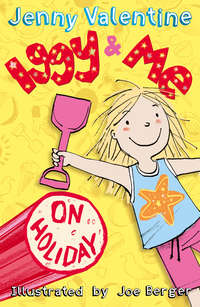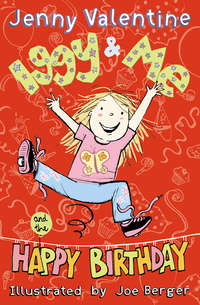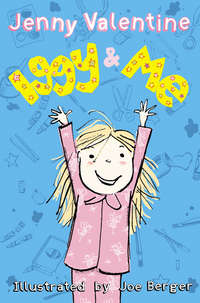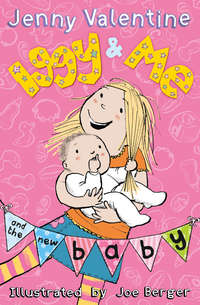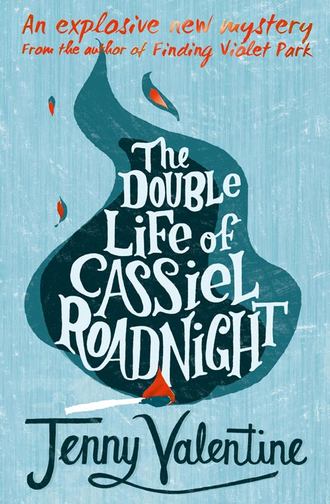
Полная версия
The Double Life of Cassiel Roadnight
I slept in there with Grandad every night. I made a nest of cushions at the end of the bed. He sat in his sagging leather chair and read to me, with the bottle on the table at his side so he wouldn’t have to stop for it. He read me H.G. Wells and John Wyndham. He read me C.S. Lewis and Charles Dickens and Tolkien and Huckleberry Finn. Every night he read until I was asleep on my cushions or he was asleep in his chair. That’s how we said goodnight, by disappearing in the middle of a sentence.
And that’s how I learned everything I know, with the clocks’ soft ticking and the heating click-click of the gas fire and the raised nap of velvet against my cheek and the smell of whisky and the sound of Grandad’s voice reading.
How could that not be a place for a child?
How could they say that?
What did they know?
FOUR
The next day I got a phone call.
Ginny came running down the corridor to find me. I was picking at a hole in my jeans. I was waiting. I was trying to take time apart minute by minute, second by second. It wasn’t working.
Ginny had sweat across her upper lip. It glistened. “Cassiel,” she said. “It’s for you. It’s your sister.”
I walked behind her, back the way she had come. When we got to the office I looked at the receiver for a moment before I picked it up. Ginny flapped with her hands and mouthed at me to talk.
“Hello?” I said.
“Cass?”
He had a sister.
I could tell how hard she was shaking by her voice. I wanted to make her stop.
I looked at Ginny. She was still flapping. I turned my back on her.
“Cass. It’s Edie.”
“Hello, Edie.”
She made a little sound, not a whole word really, and then she said, “Is that you?”
“Yes,” I said. “It’s me.”
Then I sat in the office with my eyes closed and I listened to this Edie girl I’d never met crying because I was alive. I’d imagined people jumping around, beside themselves with joy and relief, not sobbing miles away on the end of the phone. I didn’t think it would be like that.
When she stopped crying, when she talked, I pretended it was me she was talking to, me she’d been missing all this time, me she was so happy to have found. I pretended she was my sister. That way I didn’t have to feel so bad.
She said, “I’m coming to get you, Cass. Please stay where you are. Please don’t disappear again before I get there.”
“OK.”
“You promise?”
“I promise.”
“Oh God. Mum’s not here. I can’t get hold of her. I’m just going to come. I’ll be there. Don’t move!”
“I won’t move,” I said. “I’ll wait here.”
She took a long time to say goodbye. I put the phone down and I forced myself to smile at Ginny.
“Well?” she said, “How was that?”
I didn’t know why she was asking. She’d heard all she needed, hanging around by the photocopier, pretending to be busy, holding herself still so she could listen.
“Good,” I said.
“You didn’t say much,” she said.
“I never do.”
I went to my room and I sat on my bed. The dinner bell sounded and the football on TV started and the showers were free, but I just stayed there.
I should have run away. I should have got out of it while I still could. But I didn’t go anywhere. I didn’t get off my bed even. I didn’t leave the room. I didn’t move. Because suddenly I had a sister, and she’d told me not to.
Four hours later, I heard Edie before I saw her. I heard her walking towards my room and my stomach opened up like a canyon. Her shoes clapped gently next to Gordon and Ginny’s wheezy, squeaking steps.
When they came in, she stopped and put her hands up over her mouth. She stood there with Ginny beaming behind her.
I didn’t know what to do with my face.
I could feel a big flashing sign above my head that said THIS IS NOT HIM. I waited for her to notice it. I waited for her to say, “You’re not my brother,” and I thought about what would happen next. Would sirens start wailing? Would I melt like candle wax into a puddle on the floor? How many people would hit me? Where would they put me, once they knew?
And if she thought I was Cassiel? If she fitted me into his place like the wrong piece in a puzzle, what would happen then? I was more scared of that than anything. And I wanted it more than anything too.
I stood there and I waited for her to decide.
She kept her hands over her mouth. Her make-up bled from her eyes on to her skin. I thought about her putting mascara on that morning, before she knew she was going to see her missing brother.
“Say something, Cassiel,” whispered Ginny.
She said it like I was an idiot, like I was four years old. I wanted to hit her.
“Hello, Edie,” I said. My voice didn’t sound like mine.
Edie took a deep breath and she got Ginny and Gordon to leave us on our own. She didn’t speak, she just asked them with her eyes and her hands, and they said yes.
And then I was alone with her. And suddenly I knew that anything I did, just one tiny thing, a word, a look, a gesture, could blow this open, could scream the house down that I wasn’t him. I was a cell under the microscope. She was the all-seeing eye. I couldn’t breathe. I couldn’t move. I stood dead still and I watched her.
She wasn’t what I’d been expecting. She was a lot smaller than me and her hair was long and dark. Long dark hair and blue eyes overflowing with water and light, a smile so full of sadness it made me feel grateful to have seen it, like a rare flower.
“Talk to me,” she said.
I had to clear my throat. My voice was shrunken, hiding. “What about?”
She shrugged and her eyes ran and she didn’t say anything, not for a bit. She just looked at me. The asking and relief on her face made me flinch. It was like staring at the sun.
After a while she looked at the floor and said, “I don’t believe it. I can’t take this in.”
I breathed out. I just watched her. I didn’t know what else to do.
“It’s really you?” she said.
I nodded. My tongue felt swollen and dry in my mouth. I needed a drink of water.
“Say something,” she said. “Why aren’t you saying anything?”
Because I’m scared to. Because you don’t know me. Because I’ll say the wrong thing.
“It’s good to see you,” I said.
“Good?” she said. “Good? Two years, Cass. You have to do better than good.”
“Sorry.”
“I drove so fast,” she said. “I kept thinking I was going to crash. I thought I was going to turn the car over, but I couldn’t slow down.”
“Where have you been?” she said. “Why didn’t you call? What the hell happened to you?”
My lips were stuck together. Somebody had sewn my mouth shut.
“You’ve changed so much,” she said.
I felt the dusting of stubble over my chin. I rubbed my fingers across my cheeks, through my overgrown hair. I ran my tongue over my bad teeth.
“You too,” I said. Could I say that? Was that wrong?
“You are so tall.”
“Am I?”
“Why did you leave?” she said suddenly, and the skin of her voice broke, the anguish welling up underneath. “Why did you do that?”
“I’m sorry,” I said.
“I thought you were dead,” she said. “People said you were dead.”
“I’m not dead.”
She nodded again and her face caved in, and she cried, proper crying, all water and snot. She couldn’t catch her breath. She stood on the other side of the room and she looked at me like she wanted me to make it better. I didn’t know what to do. I waited for her to stop, but she crossed the room and walked right into me. She cried all over my shirt.
While she did it I shut my eyes and breathed slowly.
I had a sister and she was perfect and she cared that I was there.
I think it was the closest to happy I’d ever been. And I knew I was going to Hell for it.
I know it still. If there’s a Hell, that’s where I’ll go.
FIVE
Now and again I persuaded Grandad that we needed to go out – to the city farm maybe, or the market, or along the canal. He never saw the point. I think after years of hiding in the dust-yellow insides of his books, real life was like roping lead weights to his feet and jumping into cold water; just not something he felt like doing.
He didn’t mind me going out on my own. He said it was a good idea.
He said, “The namby-pamby children of today have no knowledge of danger and no sense of direction.”
He said, “When I was your age I was out for days at a time with nothing but a compass and a piece of string.”
He said he very much doubted I’d get lost or stolen, or fall down a manhole.
He was right. I didn’t.
Still, sometimes I persuaded him to get dressed and come with me, just because I liked him being there, just because he needed the fresh air. His skin was lightless, and thin like paper. His hair was like a burnt cloud. I told him if he didn’t get out in the sunshine once in a while he might turn into a page from one of his mildewed books, and the slightest gust of wind would blow him to nothing. I sort of believed it.
Out on my own I was quick and agile. I could walk on walls and weave through crowds and duck under bridges and squeeze into tiny spaces and jump over gates. Grandad wasn’t so good at walking. He tripped over a lot and staggered sometimes, and forgot where he was going. Once he fell into the canal. Not fell exactly – he was too close to the edge and he walked right into it, like it was what he’d been meaning to do all along. He was wearing a big sheepskin coat and it got all heavy with water and he couldn’t get up again. It wasn’t deep, it wasn’t dangerous. It was funny. He stood there with the filthy water up to his chest, soaking into his coat, changing the colour of it from sand to black.
“Come on in,” he said to me. “The water’s lovely.”
“No thanks, Grandad,” I said.
He winked at me. “This reminds me,” he said, trying to heave himself up off the bottom, “of my childhood holidays on the French Riviera.”
I think the coat weighed more than he did. He took it off in the end and waded out in his thin suit, like a wet dog. The coat lay there on the water, like a man face down with his arms stretched out on either side, looking for something on the canal floor, quietly drowning. We had to rescue it with a stick.
“I never liked this coat,” Grandad said as we walked back the way we’d come, carrying it between us like a body, straight back to the house. His teeth banged together when he talked, like an old skeleton. Water ran off him like a wet tent. His shoes were ruined. There were leaves in his hair, leaves and rat shit.
We laughed and laughed.
I didn’t know Grandad was drunk then. It never occurred to me. I don’t think I knew what drunk was. When you’re a kid you fall over and bang into things all the time. I didn’t realise you were supposed to grow out of it.
I wouldn’t have minded anyway. If you ask me, Grandad drunk wasn’t any worse than Grandad sober. Not when you love a person that much. Not when a person is all you’ve got.
I only saw Grandad cry one time and he hadn’t been drinking. He hadn’t been allowed to. It was after the accident, when I went to see him, just that once.
He was so pale, so almost lifeless I thought he was disappearing.
He tried to talk to me. He tried to tell me the truth, and his tears kept getting in the way of the words. Great racking sobs tore through his voice.
I didn’t hold him like I held Edie. I was too shocked.
I should have held him like I held her. I should have done it, but I didn’t.
SIX
Suddenly I was free to leave. Edie signed some papers to say she was responsible for me. She showed Gordon her driver’s licence to prove she was over eighteen, and who she said she was, Cassiel’s big sister and all that.
She came with me to get my things. I’d packed them in my rucksack and it was waiting on my bed.
There wasn’t much. A torch without batteries, a knife and fork I lifted from the canteen, a tennis ball, a pencil, a kingfisher feather, an empty wallet, an old notebook, some postcards, a pair of jeans, two ancient tops and a sweatshirt I’d found on some railings.
I found my rucksack in a skip, years ago. There was a slash down one side and one of the straps was broken so it got dumped. All I did was tape it up and tie a knot in it and it worked fine. It’s amazing what you can find, if you’re looking. Perfectly good things get thrown away all the time, perfectly good things and perfectly good people.
“Is that yours?’ she said.
I nodded.
“What have you got?’
“Not much.”
She reached out and took it before I could stop her. I watched her unzip it. All I could think was there might be something in there with my name on, something just waiting to give me away, but there wasn’t. My stuff looked like it had just washed up there, in the torn black inside. It looked like stuff the sea had spat out.
“I don’t recognise any of this,” she said.
I shrugged. “I guess not.”
She picked out the tiny, blue-streaked feather. “Can I have it?” she said.
“OK.”
“It’s funny,” she said, brushing the fine tip of it with her fingers.
“What is?”
“That you’ve been missing and a thing like this has been with you all this time.”
We walked outside to her car, an old silver Peugeot with a dent in its flank and one almost flat tyre. There were plastic flowers hanging from her rear-view mirror, a load of old newspapers on the back shelf. They swelled like sails and snapped shut when we opened and closed the doors.
I wondered how Cassiel Roadnight got into a car. I wondered if the way I did it might give me away.
Gordon and Ginny and a few of the boys stood in the front yard, waiting for us to go so they could get on with whatever happened next. Nobody knew what to say.
“Good luck.” Gordon had his head half though the open car window. I thought about winding it shut with his face still in it. I thought about just driving away.
“Thank you so much,” Edie said. “I don’t know how to thank you.”
Ginny said to me, “Let us know how you’re getting on.” But she didn’t mean it and she knew I wouldn’t.
“OK,” Edie said, looking at her feet and then at me, starting the car, pulling it round in reverse. “Let’s go.”
We turned on to the road, and the house and everyone in it were suddenly gone, as if they never existed. I thought for a second that maybe I’d been safer there, maybe I’d been better off. For a second I wished she’d just take me back and leave me. Now, rather than later. Now, before everyone got hurt too much.
The car was small and messy and crowded. A fallen-over basket had spilled its stuff on the floor and a big blue bag took up most of the room at my feet. There were clothes all over the back seat. The dashboard was covered in flyers and scraps of paper and parking tickets. It stank of incense. I was sitting on something. I reached underneath myself and pulled it out – a piece of old knitted blanket, just a scrap, grey with dirt and dotted with holes. I’d have guessed she used it to clean the windscreen, if the windscreen had ever been cleaned. I was about to drop it. It was the look on Edie’s face that stopped me. Instead I held it in my hand for a minute, pushed my fingers through its loops and swirls.
Edie watched me.
Was this how hard it was to be someone else? Did I have to be this vigilant? How long was I going to last, when even a scrap of filth might turn out to be something special?
Edie straightened in her chair, took a deep breath, smiled at the road.
“I thought you might have missed it,” she said. “I know you’re too old for it and everything. I just thought it would make you smile.”
“Thanks,” I said. I smiled, on cue. It felt like my face was splitting open. I put the rag in my rucksack.
It was good being in a place without lockers and filing cabinets and industrial cleaning fluid and a place for everything. I watched Edie’s hands on the steering wheel. She had a gold ring on the little finger of her right hand, a silver one on the middle of her left. The veins were raised and faintly blue beneath her skin, thin fine bones rippling with each small movement. It was hot in the car, hot and dry. The air blew in through the heaters and leeched the moisture from my eyes and my mouth. While she drove, Edie looked straight ahead and in her mirrors and at her shoulder and over at me.
“I’m going to drive slowly on the way home,” she said. “I’m not going to crash or turn the car over.”
“OK,” I said. And inside, I heard a part of me wishing that she would.
For a long time we didn’t say anything. The quiet in the car was full of us not knowing what to say.
I thought about where we were going and what it would be like and who was there waiting. I thought about how the hell I was ever going to get away with it. Every time I thought about it my body opened out like it was hollow, like forgetting something vital, like knowing you’re in trouble, like waking up to nothing but regret.
“We’re very quiet,” she said, “for people with two years of stories to tell.”
I liked it, being quiet. I couldn’t make a mistake if I was quiet.
“There’s no rush, is there?” I said.
“I suppose not,” she said. “I suppose we never talked that much before.”
She changed gear and it didn’t go in right and the car grated and squealed until she got it.
“I missed you, Cass,” she said.
What was I supposed to say to that? I looked at my feet. I looked out of the window. She was still missing him. She hadn’t stopped, poor thing. She just didn’t know it.
“I dreamt about you,” she said.
What would he have said to that? Thank you? Sorry?
“In my head you were the same as when you left,” she said. “I expected you to look the same.” She almost smiled. “It’s been two years. It’s stupid.”
We drove past a pub called The Homecoming. It looked warm inside, and noisy. I thought myself out of the car and into the pub, taking people’s drinks when their backs were turned. I saw myself through the windows.
“I wonder if Mum and Frank have got my messages,” she said. “I couldn’t get hold of them.”
I didn’t know who these people were. I didn’t have the slightest idea of what to say.
“They might not know yet,” she said. “How weird is that?”
I could see her searching my eyes for something that wasn’t there. I blinked and so did she.
“God, Cassiel,’ she said. “I can’t believe it’s you.”
I knew exactly what she meant, even if she didn’t.
SEVEN
Think of the perfect cottage, right at the end of a lane that lifts and drops through woodland, and runs high along the ridges of fields. A white picket fence, a covered porch grown thick with quince and scented roses, a garden alive with birdsong and the quiet constant thrum of a stream.
I am not making this up. I didn’t dream it or read about it. This place exists. It’s where Edie took me.
Home.
I pretended to fall asleep in the seat next to her, so I wouldn’t have to worry about what to say. I let my eyes give in and close and I stayed at the small centre of myself, listening. I listened to the engine and the tick of the indicator and to Edie breathing. I listened to the air outside the windows and the rush-rush of other cars and the music she put on and turned down low so it wouldn’t wake me.
I listened when she answered her phone. It rang once.
A woman’s voice, high and thin and tinny, said, “Is it him?”
“It’s him,” Edie said, and I knew she was looking at me while she said it. “It’s Cass.”
“Oh my God,” said the woman. “I don’t believe it.”
“He’s right next to me.”
“How is he? What’s he like? Is he OK?”
“Asleep,” Edie said. “Perfect. Tall.”
“Shall I talk to him?”
Edie nudged me. I shifted in my seat and stretched. She nudged me again, harder. I opened my eyes and looked at the moving sweep of buildings and lamp posts and trees. None of them knew the terrible lie I’d started, none of them cared.
Edie held out the phone to me like a question. I shrank from it. I shook my head. She held it out again, harder. She put it in my hand.
“It’s Mum.”
“Hello?” I said.
Breathing rattled out of Edie’s phone, shallow and ragged. It made me think of a long-distance runner, of a sick dog.
She didn’t say anything.
“Hello?”
“Who’s that?” she said. “Is it you?”
She heard the lie in my voice. A mother would. She would know straight away. I spoke away from the mouthpiece so I’d be harder to hear. “Yes, it’s me.”
Then the weeping, just like with Edie. The strange small noise and the empty feeling of listening to it. I looked at Edie. I gave her back the phone.
“Mum,” she said. “It’s over. He’s coming home.”
Nothing. More sobbing. I thought I heard her say, “Are you sure?”
“Got to go. We’ll be there in a couple of hours.”
Edie let the phone drop into her lap. “You OK?” she said.
I tried to keep my eyes on the running grey of the road ahead. I liked the way I had to keep them moving just to stay looking at the same place.
“I’m fine,” I said.
I wanted to find out where we were going. I wanted to ask how long it would take, but I couldn’t. I was supposed to know.
“What are you thinking about?” she said.
I hate that question. If you’re thinking about it, it’s private. If you wanted someone else to know, you’d speak.
“Home,” I said.
She straightened in her seat, looped a strand of hair behind her ear. “I have to tell you something,” she said.
“What?”
“You’re not going to like it.”
“OK.”
She looked over at me. She spoke too fast. “Please don’t be cross. Please don’t mind. Frank bought us a house. We moved.”
It took me a minute to work a few things out.
I didn’t mind. For me this was good news. For me it was a gift.
Edie was holding herself away from me, waiting for a reaction. I couldn’t tell if it was me that made her nervous, or her brother; the person she didn’t know or the one she did.
Cassiel was missing. Weren’t his family supposed to wait for him? Weren’t his loved ones supposed to be right there when he made it home? I pictured him making the journey, knocking on the door to a houseful of strangers, doubly abandoned. Cassiel would mind.
“That’s harsh,” I said. I shook my head.
“It wasn’t up to me,” she said, not looking at me, keeping her eyes on her mirrors, keeping her face towards the road.
“Whose idea was it?”
I listened to myself sounding bothered. I marvelled at my own hypocrisy.
Edie spoke too fast. “Frank found it,” she said. “He thought it was the best thing for Mum, you know. Give her something else to think about.”
“Right.”
“It was her dream house. Remember the one we always used to walk past on our way up to the common? It was up for sale and Frank’s been doing really well and…”
“That was nice of him,” I said.
Who the hell was Frank? A rich uncle? Their dad? Their mum’s boyfriend?
“Yes,” Edie said, smiling. “It was.”
She put her hand on mine and we drove along like that for a while, with me looking at our hands and her looking at the road.
“I thought you’d be angry,” she said.
“Do you want me to be?”
“No,” she said. “God, no. I just thought you would be, that’s all. You’ve every right.”
It made me smile, the idea that I was entitled to anything.
“It’s done,” I said. “I don’t see the point.”
I shut my eyes again and for a while I slept for real. I was looking at my face in the mirror. I was wondering how the hell I’d ended up looking like I did.


